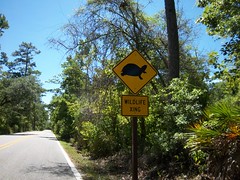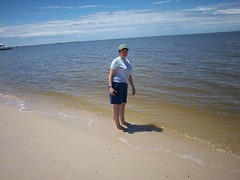This article is more than 5 years old.
ZSR’s version of Thelma and Louise headed out last Thursday for the ALA Annual Conference in New Orleans. The weather, the traffic, the car and the gas prices were all cooperative. Along the way we found interesting sights both large  and small.
and small.
We also stopped to dip Mary Beth’s toes in the Gulf of Mexico as they’d never been there before.
We arrived just in time to attend the Opening General Session. (see Mary Beth‘s and Roz‘s posts for excellent coverage of this event)
We started the next day with beignets and coffee at Café Du Monde and then got down to business. I attended a session called ACRL 101 which provided tips for first time attendees to ALA as well as information for new members of ACRL. Suggestions for participation in ACRL were given in graduated order from those taking the least time to involvement that would require a greater commitment of time. They included reading the ACRLog, following ACRL on Twitter, attending an ACRL webcast, attending a workshop at ALA, and serving on a committee. During the session there was an ACRL representative seated at each table and later we were given the opportunity to introduce ourselves and ask questions. I was at a table with the president of ACRL, Lisa Hinchliffe, who had just recently visited ZSR to present the ACRL Excellence in Academic Libraries Award. I found the session helpful and have a better understanding of the scope of ACRL.
Next, I attended a Copyright Discussion Group sponsored by the ACRL. The discussion was led by Brandon Butler, Director of Public Policy Initiatives at the Association of Research Libraries (ARL). The ARL is preparing a Code of Best Practices in Fair Use for Academic and Research Libraries. Mr. Butler reported that they will soon complete the first phase, interviewing librarians anonymously to determine, “how fair use comes into contact with practice.” He emphasized that the ARL does not seek publicity in this process and that the initial draft will not be made available for public scrutiny. The code will address fair use practices in areas such as ILL, electronic reserves, digital collections, and institutional repositories. Butler indicated that the Practices will be “affirmative”. The intent is to encourage librarians use their right to fair use and he stated that the Code’s “legal force comes from its use on the ground.” He said that there are some groups that want to “keep librarians in fear.” The ARL hopes to finish writing the Code of Best Practices by the end of 2011. It will be posted on the Center for Social Media website when it becomes available.


4 Comments on ‘New Orleans or Bust!’
Sounds like a great experience-thanks!
I can’t wait to see the ARL best practices document.
Great pictures!
Fun pictures. I’m interested in the Code of Best Practices, as well!